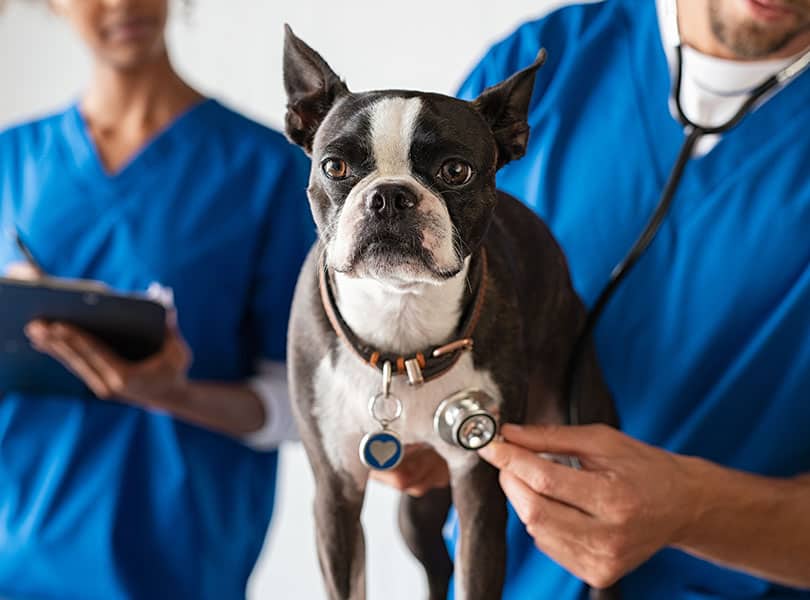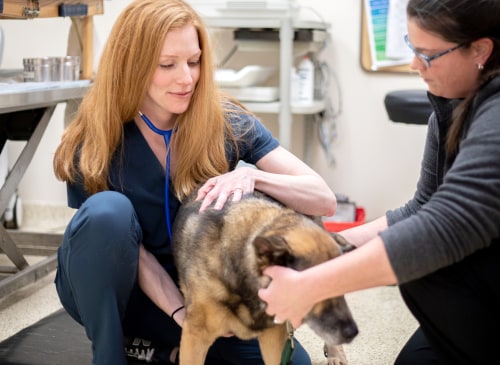A Beginner’s Guide to Understanding CT Scans For Dogs}
Discovering the Necessary Solutions Offered by a Veterinary Cardiologist: Recognizing Ultrasound and CT Scan Strategies
Veterinary cardiologists play a vital duty in the health and wellness of family pets by detecting and dealing with different heart conditions. They utilize advanced imaging strategies, such as cardiac ultrasound and CT scans, to provide accurate analyses. Each method has its distinctive benefits and applications. Understanding these methods is necessary for animal proprietors seeking the very best look after their buddies. What variables should family pet proprietors consider when picking in between these analysis tools?

The Role of Vet Cardiologists in Family Pet Medical Care
Vet cardiologists play a vital duty in the healthcare of pet dogs, focusing especially on identifying and dealing with heart-related problems. They possess specialized training that permits them to interpret complex diagnostic examinations and recognize different cardiovascular issues. These experts utilize innovative methods, such as echocardiography and electrocardiography, to examine heart feature and structure accurately.Veterinary cardiologists also develop customized therapy plans that may consist of medications, lifestyle modifications, and, in some cases, surgical treatments. Their expertise includes informing pet owners about heart health, highlighting the relevance of routine exams and very early detection of prospective problems. Collaboration with general veterinarians is vital, as it ensures detailed care for animals with presumed cardiac issues. By providing specialized services, veterinary cardiologists considerably improve the quality of life for pet dogs and supply tranquility of mind for their proprietors, reinforcing the importance of heart health in general family pet wellness.
Common Heart Issues in Pet Dogs
Usual cardiac issues in pets can significantly affect their health and top quality of life. Heart murmurs, numerous sorts of cardiomyopathy, and congenital heart flaws are among one of the most widespread conditions that veterinarians run into. Ultrasound For Dogs. Comprehending these issues is important for pet dog proprietors to assure prompt diagnosis and suitable therapy
Heart Murmurs in Pets
Although heart murmurs can be a resource of problem for pet dog owners, they are not always a measure of significant health concerns. A heart murmur is an unusual sound created by turbulent blood flow within the heart. In pets, these whisperings can be caused by different elements, consisting of hereditary heart defects, valve problems, or even stress and anxiety during examinations. Several pets with heart murmurs lead typical lives without substantial health impacts. To identify the underlying reason, veterinary cardiologists often utilize diagnostic strategies such as echocardiograms and Doppler ultrasounds. Early discovery and evaluation are crucial, as they might aid handle any kind of potential heart issues properly. Family pet proprietors are urged to consult their vet for an extensive analysis if a heart murmur is detected.
Cardiomyopathy Kind Explained
Cardiomyopathy incorporates a team of illness influencing the heart muscle, causing endangered heart feature in animals. The most typical kinds consist of expanded cardiomyopathy (DCM), hypertrophic cardiomyopathy (HCM), and restrictive cardiomyopathy (RCM) DCM mostly affects dogs, triggering the heart to enlarge and deteriorate, which diminishes its capability to pump blood successfully. On the other hand, HCM is a lot more widespread in pet cats, characterized by the thickening of the heart wall surfaces, frequently leading to obstructed blood circulation. RCM, though less usual, occurs when the heart muscle mass becomes rigid, limiting its capability to loaded with blood. Each type provides one-of-a-kind obstacles in medical diagnosis and treatment, demanding specialized vet cardiological evaluation to ensure peak management and take care of impacted family pets.
Congenital Heart Problems
Congenital heart defects stand for a substantial group of cardiac problems in animals, unique from obtained conditions such as cardiomyopathy - Board Certified Veterinary Cardiologist. These defects are structural problems present at birth, affecting the heart's normal feature. Typical kinds consist of license ductus arteriosus, ventricular septal issues, and pulmonic stenosis. Symptoms might vary extensively, ranging from moderate to severe, and can consist of workout intolerance, coughing, and difficulty breathing. Early diagnosis through advanced imaging techniques like ultrasound is essential for effective monitoring. Vet cardiologists play an important role in recognizing these problems and suggesting proper therapy choices, which may include clinical administration or medical intervention. Identifying hereditary heart problems enables far better results and boosted high quality of life for affected animals
Comprehending Cardiac Ultrasound: How It Works
A substantial number of vet methods now use heart ultrasound as an essential diagnostic device for examining heart wellness in pets. This non-invasive strategy makes use of high-frequency acoustic waves to create photos of the heart's structure and function. Throughout the procedure, a veterinary technician applies a gel to the pet's upper body and makes use of a transducer to discharge ultrasound waves. These waves bounce off the heart and surrounding structures, creating real-time images on a monitor.Veterinarians can examine various aspects of heart health and wellness, including chamber dimension, wall surface movement, and valve feature. Additionally, cardiac ultrasound permits the discovery of abnormalities such as liquid build-up and hereditary heart flaws. This method is essential for diagnosing conditions that may not show up with basic radiographs. By providing thorough details regarding the heart's anatomy and efficiency, cardiac ultrasound aids in developing reliable treatment plans for pets struggling with heart problem.
The Relevance of CT Scans in Detecting Heart Issues
Just how do CT scans boost the diagnosis of heart disease in vet medication? CT scans supply comprehensive cross-sectional pictures of the heart and surrounding structures, enabling veterinarians to envision complicated anatomical partnerships. This imaging strategy is particularly beneficial in determining hereditary heart defects, cardiac tumors, and problems in capillary. By utilizing innovative imaging algorithms, CT scans can evaluate heart chamber dimensions and feature, providing an extensive sight that may be hard to achieve with traditional methods.Additionally, CT angiography can imagine blood flow and recognize areas of constriction or blockage, which is vital for planning prospective treatments. The speed and precision of read review CT scans also help with quick medical diagnoses, important in emergency scenarios. Eventually, the consolidation of CT scans right into vet cardiology significantly improves the accuracy of diagnoses, making it possible for targeted therapy strategies and enhancing client outcomes for animals suffering from heart disease.
Contrasting Ultrasound and CT Scan Strategies
While both ultrasound and CT scans are invaluable tools in veterinary cardiology, they offer distinct advantages and constraints that influence their use in identifying heart conditions. Ultrasound, or echocardiography, offers real-time imaging of the heart's structure and feature, enabling veterinarians to assess heart chambers, valves, and blood flow. It is particularly effective for evaluating conditions like coronary infarction and cardiomyopathy. However, ultrasound may be limited in envisioning specific anatomical frameworks because of individual size or obesity.In contrast, CT checks deal comprehensive cross-sectional pictures of the heart and bordering tissues, making them suitable for identifying structural abnormalities, growths, or vascular problems. CT scans provide detailed understandings, they require sedation and may involve radiation exposure. Ultimately, the choice between ultrasound and CT checks depends on the details clinical situation, the patient's problem, and the info required for an exact medical diagnosis.
Therapy Alternatives Available Via Veterinary Cardiology
Veterinary cardiology provides a variety of Recommended Reading treatment alternatives customized to attend to different heart disease in animals. Treatment plans commonly start with way of living modifications, including diet changes and workout modifications, targeted at improving general heart health and wellness. Drugs play an essential role, with cardiologists prescribing drugs such as diuretics, beta-blockers, and ACE inhibitors to enhance and manage symptoms cardiac function.In more serious instances, interventional procedures, such as balloon valvuloplasty or stent placement, might be needed to minimize obstructions or improve blood flow. For particular genetic heart issues, surgical alternatives may be checked out to remedy architectural problems. In addition, recurring surveillance and follow-up care are essential elements of an extensive therapy plan, permitting for timely adjustments based on the pet dog's action to therapy. navigate here In general, vet cardiology concentrates on giving efficient, individualized treatment to maximize the wellness and wellness of animal patients with heart problems.
Exactly how to Prepare Your Animal for a Cardiac Examination
Preparing a family pet for a heart evaluation is important to ensure accurate results and a smooth procedure. Owners ought to initially set up the appointment with the vet cardiologist and go over any type of details demands or problems. It is advisable to hold back food for at the very least 12 hours before the analysis, as this assists improve imaging high quality during treatments like ultrasound or CT scans.Additionally, maintaining a tranquil setting on the day of the visit can help in reducing the family pet's stress and anxiety. It is beneficial to bring along any appropriate clinical records, consisting of previous tests and drugs (Board Certified Veterinary Cardiologist). Proprietors should likewise ensure that their pet dog is comfy and leashed throughout transportation to the clinic. Familiarizing themselves with the evaluation process can help and relieve fears in asking notified concerns during the assessment. By following these steps, proprietors can contribute significantly to the efficiency of the cardiac assessment
Regularly Asked Inquiries
How much time Does a Cardiac Ultrasound or CT Check Take?
The period of a heart ultrasound generally ranges from 30 to 60 minutes, while a CT check might take around 15 to half an hour. Factors such as the patient's condition can affect these time estimates.

Exist Any Type Of Threats Connected With These Analysis Treatments?

Can I Stick With My Animal Throughout the Procedure?
The veterinary facility's plan usually determines whether pet dog owners can stay during treatments. While some facilities encourage owner presence for convenience, others may call for separation to ensure security and suitable conditions for diagnostic imaging.
Exactly how Much Do These Diagnostic Tests Normally Expense?
The costs of diagnostic tests, such as ultrasound and CT scans, normally differ based on place and center. Usually, prices vary from a few hundred to over a thousand bucks, mirroring the intricacy and innovation involved.
What Is the Healing Refine After a Heart Assessment?
The healing process after a cardiac evaluation includes keeping track of the family pet for any kind of prompt responses, making certain comfort, and limiting physical task. Vets generally give post-evaluation directions to lead pet proprietors during this vital recovery period. Heart murmurs, different types of cardiomyopathy, and congenital heart problems are amongst the most widespread problems that vets come across. A heart whispering is an irregular noise generated by unstable blood circulation within the heart. Cardiomyopathy encompasses a team of illness influencing the heart muscle mass, leading to compromised cardiac feature in pets. Hereditary heart flaws stand for a considerable classification of heart concerns in pet dogs, unique from acquired conditions such as cardiomyopathy. Ultrasound, or echocardiography, offers real-time imaging of the heart's framework and function, permitting veterinarians to examine heart chambers, shutoffs, and blood flow.